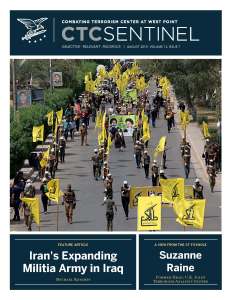From the Editor
In our feature article, Michael Knights draws on six research visits to Iraq in 2018 and 2019 to document the expanding footprint region-by-region of pro-Iranian militias in Iraq that were previously labeled “Special Groups” by the United States and in some cases designated as terrorist organizations. Knights assesses “that the Special Groups (not including 18,000-22,000 Badr troops) currently have 63,000 registered personnel … 15 times the size of the Special Groups in 2010, when there were probably as few as 4,000 Special Group operatives in Iraq (again not including Badr personnel in 2010).” He notes a key driver for their growth in manpower and popularity in Iraq was their role in fighting the Islamic State and liberating Sunni population centers under Islamic State control. He writes that “a pantheon of smaller, newer pro-Iran militias is arguably closer to the Islamic Revolutionary Guard Corps than larger and older pro-Iranian militias such as Badr and Asa’ib Ahl al-Haq” and identifies Kata’ib Hezbollah led by U.S.-designated terrorist Abu Mahdi al-Muhandis as the greatest threat to U.S. interests. With pro-Tehran militias expanding their presence across Iraq and U.S. influence in Iraq reduced since its 2011 troop withdrawal, he argues the United States “needs to be parsimonious and pragmatic if it wishes to push back effectively.”
Our interview is with Suzanne Raine, who was the head of the United Kingdom’s Joint Terrorism Analysis Centre (JTAC) between 2015 and 2017. She outlines to Raffaello Pantucci the lessons learned from her work in counterterrorism and the threat landscape as she sees it. Two articles in this issue focus on the Western Balkans. Adrian Shtuni provides a qualitative and quantitative assessment of the security threats posed by foreign fighters and homegrown jihadis from the region. Kujtim Bytyqi, the Acting Director of the Department for Analysis and Security Policies at the Kosovo Security Council Secretariat, and Sam Mullins outline Kosovo’s experience dealing with returning foreign fighters. Finally, Ross Dayton documents how the Maduro regime in Venezuela has increased its reliance on paramilitary groups, including the Colombian left-wing guerrilla group ELN, which was responsible for the suicide car bomb attack on the National Police Academy in Bogotá, Colombia, in January 2019.
Paul Cruickshank, Editor in Chief
 Skip to content
Skip to content

